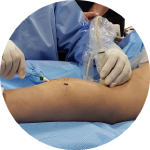
Radiofrequency ablation (RFA) is proven to effectively ablate greater saphenous vein (GSV) reflux. It is a safe, effective alternative to stripping the GSV, the small saphenous vein, and accessory saphenous veins. The use of computer-controlled feedback for controlled application of bipolar electrothermal energy has been the primary RFA modality since 2001, but recently specialized catheters have become available for thermal ablation.
In a recent presentation, Paul McNeill, MD, discussed RFA and compared two RFA systems. Vein Global subscribers can access a video of his lecture on the subject at a meeting of the International Vein Congress.
Background on Radiofrequency AblationRFA is minimally invasive and takes about 30 minutes to 1 hour to complete. It is performed with tumescent anesthesia and requires a minimal recovery time. Complications after the procedure are rare and generally temporary.
Some problems can occur in RFA. These affect approximately 1% of patients:
- Heat-induced thrombosis
- Deep vein thrombosis (DVT) and pulmonary embolism
- Superficial thrombophlebitis
- Skin injury
- Nerve injury
RFA generally improves patients’ quality of life, decreases the venous clinical severity score (VCSS), and brings about reversion to a lower CEAP (clinical, etiologic, anatomic, and pathophysiologic) class afterward. Patients experience minimal discomfort during and after the procedure.
There are a few contraindications to RFA:
- Vein size of <2 mm or >15 mm, although there are some exceptions
- Vein that is very superficial in relation to the skin, which increases the risk of thermal injury
- Active thrombosis
- Anatomic issues: chronic segmental occlusions, some instances of tortuosity
- Active infection
- Extensive DVT—selective use
Endovenous RFA was first approved by the US Food and Drug Administration (FDA) in 1999, and the first promising reports of its use were published in 2000.
In this video presentation, Dr. McNeill reviews several device options for performing radiofrequency ablation. There are nuanced differences in feature specs across the various devices as outlined by Dr. McNeill.
A subscription to Veinglobal.com provides access to more than 200 on-demand instructional, inspirational, and innovative presentations on surgical procedures, practice management, research data, and more. Vein Global is a tool for your entire practice to stay current on venous education.
Recent Posts

Review of Radiofrequency Ablation Devices

Overtreatment in CVD Leads to Superficial Ablation Abuse

Ultrasound-guided Foam Sclerotherapy

Recurrent Stent Occlusion: Endovenectomy, Bypass, or Compression Only

Optimizing Deep Vein Images: The Profunda Femoris Vein

A Closer Look at Swollen Legs: Edema Differentiation

Vein Global and IVC are Evolving to Launch the Next Decade of Endovascular Innovation and Education

Phlebectomy: Technical Steps with Jose I. Almeida, MD, FACS, RPVI, RVT

The Spectrum of Vacuum-Assisted Venous Thrombectomy

Sclerotherapy: Technical Steps with Julian J. Javier, MD, FSCAI, FCCP

